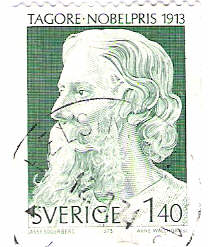
(Tagore was far from being the modern stereotypical "Bentley-driving guru", preying
on affluent young Western skulls full of mush, as you can see.)
Anyway, I found this in an omnibus of his writings, A Tagore Reader.
"While India lay cramped and divided, betrayed by its own idealism, it was called upon to meet the greatest trial in her history, the challenge of Western imperialism. For the Aryans and the Muslims may have deprived a few Dravidian and Hindu dynasties of their rule in India, but they settled down among the people and their achievements became India’s heritage. But here was a new im personal empire, where the rulers were over us but not among us, who owned our land but could never belong to it. So disintegrated and demoralized were our people that many wondered if India could ever rise again by the genius of her own people, until there came on the scene a truly great soul, a great leader of men, in line with the tra dition of the greatest sages of old, whom we are today assembled to honor—Mahatma Gandhi. Today no one need despair of the fu ture of the country, for the unconquerable spirit that creates has already been released. Mahatma Gandhi has shown us a way which, if we follow, shall not only save ourselves but may also help other peoples to save themselves.
"He who has come to us today is above all distinguished by his free dom from any bias of personal or national selfishness. For the selfish ness of the Nation can be a grandly magnified form of that same vice; the viciousness is there all the same. The standard of conduct fol lowed by the class called politicians is not one of high ideals. They think nothing of uttering falsehoods, they have no compunction in vitally hurting others for their own aggrandizement. . - . Such people plume themselves on being practical and do not hesitate to ally themselves with the forces of evil if they think that evil will accomplish their end. But tactics of this kind will not pass the audit of the Dispenser of our fortunes; so while we may admire their cleverness, we cannot revere them. Our reverence goes out to the Mahatma whose striving has ever been for truth; who, to the great good fortune of our country at this time of its entry into the new age, has never, for the sake of immediate results, advised or condoned any departure from the standard of universal morality.
"He has shown the way how, without wholesale massacre, freedom may be won. There are doubtless but few amongst us who can rid our minds of a reliance on violence, who can really believe that victory may be ours without recourse to it. For even in the Mahabharata, not to speak of the “civilized” warfare of the modem age, we find Dharma yuddha to be full of violence and cruelty. Now it has been declared that it is for us to yield up life, not to kill, and yet we shall win! A glorious message, indeed, not a counsel of strategy, not a means to a merely political end. In the course of unrighteous battle death means extinction; in the non-violent battle of righteousness something remains; after defeat victory, after death immortality. The Mahatma has realized this in his own life, and compels our belief in this truth.
"As before, the genius of India has taken from her aggressors the most spiritually significant principle of their culture and fashioned of it a new message of hope for mankind. There is in Christianity the great doctrine that God became man in order to save humanity by taking the burden of its sin and suffering on Himself, here in this very world, not waiting for the next. That the starving must be fed, the ragged clad, has been emphasized by Christianity as no other religion has done. Charity, benevolence, and the like, no doubt have an important place in the religions of our country as well, but there they are in practice circumscribed within much narrower limits, and are only partially inspired by love of man. And to our great good fortune, Gandhiji was able to receive this teaching of Christ in a living way. It was fortunate that he had not to learn of Christianity through professional experts, but should have found in Tolstoi a teacher who realized the value of non-violence through the multi farious experience of his own life struggles. For it was this great gift from Europe that our country had all along been awaiting.
"In the Middle Ages we also had received gifts from Muslim sources. Dadu, Kabir and other saints had proclaimed that purity and libera tion are not for being hoarded up in any temple, but are wealth to which all humanity is entitled. We should have no hesitation in ad mitting freely that this message was inspired by contact with Islam. The best of men always accept the best of teaching, whenever and wherever it may be found, in religion, moral culture, or in the lives of individuals. But the Middle Ages are past, and we have stepped into a New Age. And now the best of men, Mahatma Gandhi, has come to us with this best of gifts from the West."
Tagore spoke too soon on the bit about "without wholesale massacre", of course. But it's still a lovely sentiment.

great post - thanks for posting that, I am unfamilar with that writer and want to find out more. Great picture of the kids with their grandfather, something wonderful of which to be very proud.
ReplyDeleteThanks for that great speech by Tagore ji, particularly for his thoughts about Christianity.
ReplyDeleteWhat has "drifted" your blog or First Things !!!???
The drifter would be me. Just couldn't stay on topic anymore.
ReplyDelete